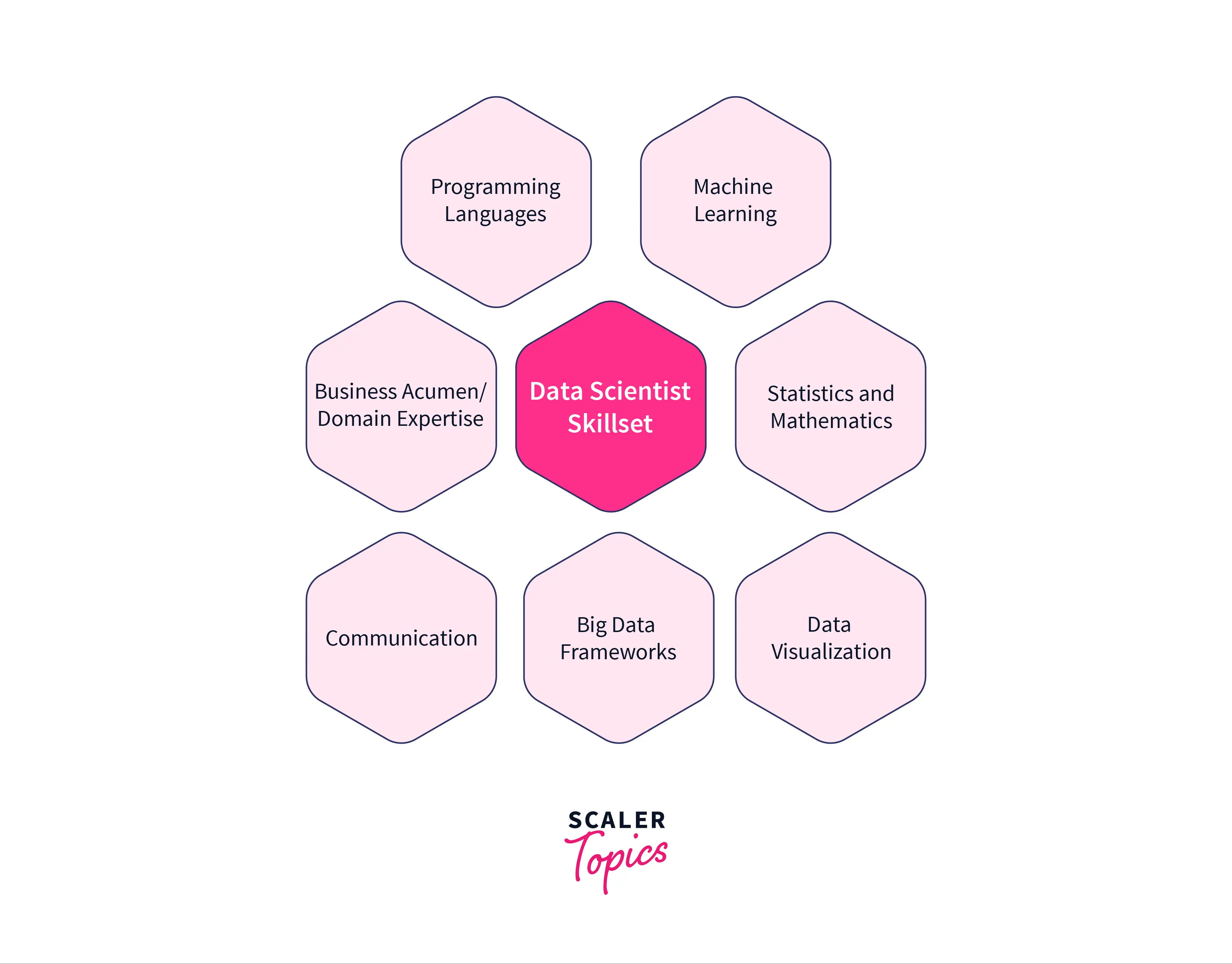Data Scientist Job Description

Introduction
The core advantage of data is that it tells you about the world you didn’t know before.
-Hilary Mason, Founder of Fast Forward Labs
Data Scientists have become a catalyst for the growth and success of organizations over the years. Data Scientists have helped organizations improve business processes and operations by using overwhelming amounts of data to derive valuable insights. Due to this, demand for Data Scientists has skyrocketed in the past few years and is expected to grow in the next decade.
The U.S. Bureau of Labor Statistics has estimated a 22 percent growth in data science jobs during 2020-2030. Data Scientists are one of the highest-paid professionals in the world. In India, based on Glassdoor, the average salary of a Data Scientist comes to around 10.5 LPA. Data Scientist has already been regarded as the sexiest job of the 21st century by Harvard Business Review. This ensures that this field provides a lucrative and promising career path along with high salaries.
So in this article, we will discuss data scientist job description, what are their responsibilities, and what qualifications and skills are required to build a career in this field.
Types of Data Scientists
Almost all industries require Data Scientists to improve their business operations by analyzing the data they generate and store. Few of the most common industries where Data Scientists work include -
- Finance
- Academia
- Scientific Research
- Healthcare
- Retail/E-Commerce
- Information Technology
- Government
- Cyber Security
- Media
- Telecommunication
What Does a Data Scientist Do?
- Data Scientists are true data experts that combine concepts of Computer Science, Statistics, and the Business World to dig into data and help answer various business questions.
- Data Scientists extract, analyze, and interpret large amounts of structured and unstructured data from a variety of data sources to drive decision-making processes in organizations. They employ advanced analytical techniques such as Machine Learning, Statistics, etc. to develop models that can make predictions about the future using programming languages such as Python, R, etc.
- They also collaborate with various stakeholders to understand their business requirements and communicate findings or recommendations to them.
Data Scientist Job Responsibilities
Working as a Data Scientist can be intellectually challenging, analytically satisfying, and put you at the forefront of new advances in technology. Below are typical responsibilities involved in a Data Scientist’s day-to-day life -
- Understanding Business Requirements
- Data Scientists must have strong business acumen/domain expertise, collaboration, and communication skills to understand an organization’s business problems by working closely with multiple stakeholders.
- Data Collection
- Once the business problem is understood and framed into a Data Science problem, the next step for Data Scientists is to identify relevant data stored in organizations’ repositories.
- Data Scientists collect large amounts of structured or unstructured data stored in a variety of data sources using programming languages such as SQL, Web Scraping, APIs, etc.
- Data Preparation
- After collecting the data from different sources, Data Scientists clean and prepare this data by discarding irrelevant information, imputing missing values, handling outliers, and employing sophisticated statistical or analytical methods.
- Exploratory Data Analysis (EDA)
- This is a key step in the implementation of any Data Science solution. It helps Data Scientists identify underlying trends and patterns in the data.
- Data Scientists perform Exploratory Data Analysis (EDA) on the data by applying various statistical (correlation, mean, mode, etc.) or visualization methods (scatter plots, histograms, bar charts, etc.) using programming languages such as Python, R, etc.
- Feature Engineering
- It is the process of identifying the most impactful and relevant features from the raw data by applying business domain knowledge. These engineered features can help in boosting the accuracy of the developed ML models.
- ML Model Development
- It is the most important part of the job of a Data Scientist. Data Scientists develop predictive or prescriptive models by applying various Machine Learning algorithms using programming languages such as Python, R, Scala, etc.
- Communication
- Once the ML model is developed and insights are derived, Data Scientists need to communicate findings to business stakeholders and recommend changes to existing procedures or strategies to solve given business problems.
- Stay Up to Date
- Data Science is a fast-evolving field. To stay tuned, Data Scientists must keep track of ongoing research in related fields such as Machine Learning, Deep Learning, Natural Language Processing, other analytical techniques, etc.
Qualifications for Data Scientist
In general, Data Scientists hold degrees in computer science, engineering, statistics, data science, economics, or closely related fields. Having an advanced degree such as a Master’s or Ph.D. will also provide an added advantage when applying for a Data Scientist job. This has also been suggested by various reports. For example, a study performed by Burtch Works suggests that 94% of Data Scientists have at least a master’s degree.
However, if you have the right set of technical skills required to perform the job of a Data Scientist, having a master's or advanced degree is not a mandatory requirement to build a career in the Data Science field. The important things is that your skills should be aligned with the data scientist job description in which you are applying to.
Skills for Data Scientists
If you want to become a Data Scientist, below are some of the technical as well as interpersonal skills you will need to be proficient in which will full the data scientist job description - Programming Languages
- Data Scientists spend a lot of time using programming languages to perform various Data Science tasks such as collecting or preparing data, building and developing machine learning models, Exploratory Data Analysis, Feature Engineering, etc.
- Some of the most popular programming languages data scientists use to perform various methods are - Python, R, SQL, Scala, SAS, etc. Having knowledge of other programming languages such as C++, Java, etc. is a big plus.
Machine Learning
- Building and developing machine learning-based predictive or prescriptive models are the most important part of the job of a Data Scientist.
- Data scientists must have an in-depth understanding of underlying mathematical concepts of a wide array of Machine Learning algorithms spanning classification, regression, deep learning, etc.
Statistics and Mathematics
- Statistics and Mathematics are integral parts of most Data Science techniques and solutions. Understanding the fundamentals of various statistical analysis techniques such as correlation, p-value, A/B testing, etc., and mathematical concepts such as Linear Algebra and Calculus is very important for a Data Scientist job.
Data Visualization
- Visualization is a key part of a Data Scientist’s job to identify underlying patterns in the data by plotting the data using charts and graphs.
- Data Scientists should be familiar with various visualization tools such as Python, or R visualization libraries, Tableau, PowerBI, Excel, etc.
Big Data Frameworks
- Data Scientists frequently deal with large amounts of data. Data Scientists should have familiarity with various Big Data processing frameworks such as Apache Spark, Hadoop, etc. This will enable them to deal with large amounts of data efficiently and quickly.
Communication
- As a data scientist, you will be required to communicate your findings and recommendations to non-technical colleagues or business stakeholders. This may include senior management, other departments within your company, or even customers. It is therefore essential to develop strong communication skills to become a Data Scientist.
Business Acumen/Domain Expertise
- Business acumen can be defined as the ability to translate business problems into data solutions and connect them to business impact. A Data Scientist must acquire business acumen to process the data in such a way that it can help companies grow and become profitable.
- If Data Scientists can’t understand businesses and their problems, then they can’t use data science techniques in the best way for the organizations. Many data scientists focus on learning technical skills but spend little time developing the interpersonal skills needed to become successful. Having business acumen is the kind of skill that can help you stand out from the crowd.

How to Become a Data Scientist?
Data Science is a vast field, and learning all the skills required to get hired for the job of a Data Scientist can make you feel intimidated or overwhelmed. Pursuing a career in Data Science takes time, effort, and knowledge. You will have to spend time on upgrading your skills, searching for a job, checking out data scientist job description, and preparing for the interviews.
We have listed a few things which you should consider to start your career as a Data Scientist -
- Be Patient and focus on developing a discipline to learn the skills required for a Data Scientist job.
- Prepare a strong learning roadmap.
- Focus on learning the fundamentals first and then gradually move on to learn advanced concepts.
- Learn and master key skills required to become Data Scientist such as Data Analytics, Programming, Statistics, Machine Learning, Business skills, etc.
- Sharpen your theoretical skills by working on projects with real-world data. Remember that organizations always prefer practical applications over theoretical knowledge.
- Consider earning a certificate in Data Science or Business Analytics.
- Create a strong and impactful resume by showcasing a diverse set of projects.
- Search for typical questions asked in Data Scientist interviews and prepare answers for them.
At the same time, you can check out Scaler’s Data Science program.
Conclusion
The future of Data Science is quite promising and offers a lucrative and promising career path along with high salaries.
As organizations are generating more and more data, they are looking for Data Scientists who can study and analyze this large amounts of data and can help them solve various business questions. This has caused demand for Data Scientists to skyrocket in recent years and is expected to grow in the next decade.
The U.S. Bureau of Labor Statistics has estimated a 22 percent growth in data science jobs during 2020-2030. Data Scientist has already been regarded as the sexiest job of the 21st century. And, for three years in a row, it has been named the number 1 job in the US by Glassdoor. Using this guide, you can understand the Data Scientist job description and what skills you need to acquire before applying for your first Data Scientist job.
